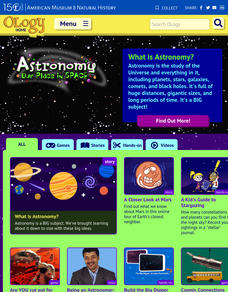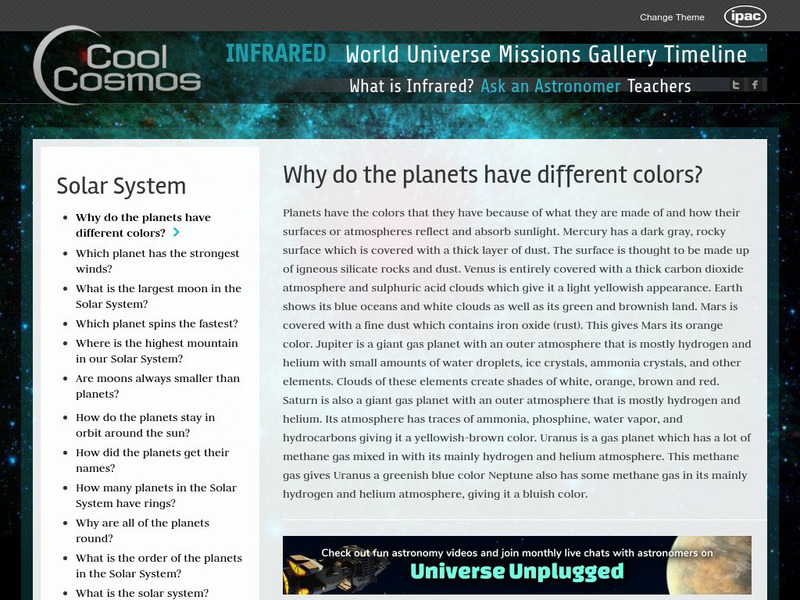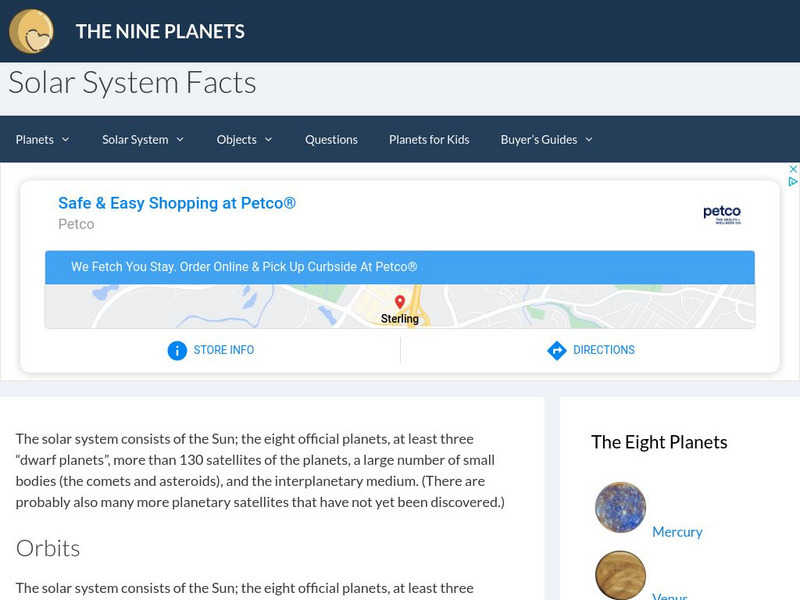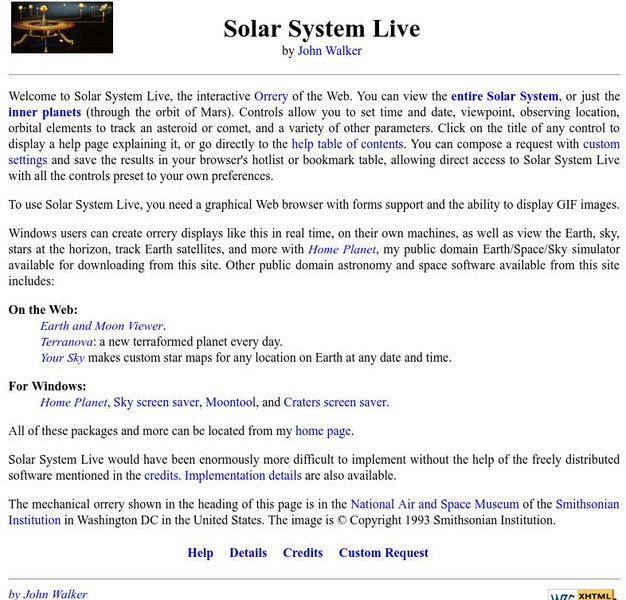American Museum of Natural History
Planetary Mysteries
Get to know our little part of the vast universe. Learners read about the common and not-so-common facts about each of the planets in the solar system. The interactive lesson includes a large amount of information as well as a quiz to...
American Museum of Natural History
Beyond Planet Earth
Scholars take a journey through space with 16 eye-catching images. Along the way, learners read captions starting with the moon, then move onto asteroids, Mars, and Jupiter.
American Museum of Natural History
Planetary Mysteries
A website all about planetary mysteries—it's a one-stop-shop for all things, stars, planets, and space travel. Scholars read an astronomy overview to discover the page's big ideas, then choose from the plethora of resources, including...
American Museum of Natural History
A Closer Look at Mars
A website looks at how we know so much about Mars—telescopes, robots, and spacecraft—and the search for martian life. Following the informational text are three questions that quiz pupils about possible life on Mars.
American Museum of Natural History
What is Astronomy?
Go study the universe. Pupils learn seven aspects about astronomy and astronomers. They begin to learn about constellations; distance and motion between objects; gravity; the electromagnetic spectrum; dark matter and energy; and teams of...
American Museum of Natural History
One-on-One With The Sun
Follow along as Stella Stardust interviews the sun. A fun and informative interview provides scholars with information about the sun.
NASA
Nasa: Solar System Exploration
This stunning site on the solar system gives a great overview of the planets and our sun. Learn about each object's size, vital statistics, and moons. Then go on for a more in depth look at these objects in the column on the left.
Other
Sea and Sky: A Tour of the Solar System
Take a virtual tour of the solar system starting with detailed information about the sun.
California Institute of Technology
Cool Cosmos: Ask an Astronomer for Kids: Solar System
Resource presents information about the solar system through a list of most frequently asked questions. Click on each question and be transported to a wealth of knowledge about our solar system and the planets within it.
NASA
Nasa: Our Solar System Lithograph Set
View a lithograph set that includes pictures and brief descriptions of planets, sun, asteroids, comets, meteors, and meteorites. While viewing the lithograph learn important dates and interesting facts about our solar system.
BBC
Bb Ci Space: Solar System
Take a journey through the solar system with this interactive guide. Includes planetary history, "travel information," "tourist highlights," and video clips. Games and quizzes include a Solar System jigsaw that prompts the student to...
Space Telescope Science Institute
Hubble Site: Solar System Images
A listing of clickable images of objects in the Solar System from the Hubble telescope that includes the following: Venus, Mars, Jupiter, Jupiter's satellites, Saturn, Saturn's rings and satellites, Uranus, Uranus' rings and satellites,...
Other
The Apollo Society: The Solar System
Contains a small set of images of solar system objects and a series of links to information about all solar system objects. Solar System Tours link to excellent image collections.
National Earth Science Teachers Association
Windows to the Universe: Our Solar System
Our solar system is filled with a wide assortment of celestial bodies - the Sun itself, our eight planets, dwarf planets, and asteroids - and on Earth, life itself! The inner solar system is occasionally visited by comets that loop in...
Views of the Solar System
Views of the Solar System: The Solar System
Explore the solar system through this site that includes vivid multimedia resources. Learn the latest scientific discoveries, the history of space exploration, and much more. Site includes videos, graphics, articles, and photographs.
NASA
Nasa Star Child: The Solar System
Discover information about parts of the Solar System, along with definitions just by clicking on highlighted vocabulary terms. Be sure to try the "Solar System Activities" to review the material from these pages.
Enchanted Learning
Enchanted Learning: The Planets
This survey of the planets includes all the basics, size, mass, atmosphere, length of day, and the like. It features interactive activities and learning exercises and compares all of the planets in colorful tables.
PBS
Pbs Learning Media: All Planet Sizes
This illustration from the Lunar and Planetary Laboratory shows the approximate sizes of the planets relative to each other. Note that the planets are not shown at appropriate distances from the Sun.
Nine Planets
The Nine Planets: An Overview of the Solar System
A detailed overview of the history, mythology, and current scientific knowledge of each of the planets and moons in the solar system.
Other
Space Science Institute: Alien Earths: Star and Planet Formation
Learn about the lives of stars, and how stars and planets form. The Interactive activity, 'Planet Families' requires Adobe Flash and cannot be launched.
Fourmilab Switzerland
John Walker: Solar System Live
This planetarium program allows you to create an accurate model of the solar system with icons or pictures of each planet. You can specify a date in the past or the future, change the viewpoint to any latitude/longitude, and even view in...
NASA
Nasa: Sci Jinks: How's the Weather on Other Planets?
Compare weather here on Earth to other planets and moons in our solar system. You will find many similarities and differences.
Nine Planets
The Eight Planets: Just for Kids
Here is a clear, simple picture of the solar system. Click on the names of the planets to learn more about each. Clicking on underlined terms takes you to more and more detailed scientific information.
Ducksters
Ducksters: Kids Science: Learn About the Solar System
What makes up the Solar System? Kid astronomers learn about the planets and the sun.
Other popular searches
- Solar System Inner Planets
- Solar System Planets
- Solar System and Planets
- Science Planets Solar System






















